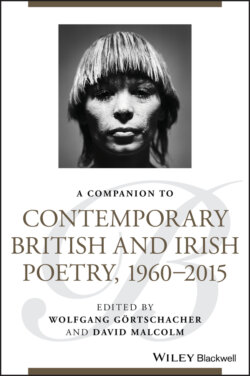Читать книгу A Companion to Contemporary British and Irish Poetry, 1960 - 2015 - Группа авторов - Страница 59
References
Оглавление1 Armitage, Simon (2000). “Re‐Writing the Good Book.” In: Strong Words: Modern Poets on Modern Poetry (eds. W.N. Herbert and Matthew Hollis), 252–255. Newcastle: Bloodaxe.
2 Auden, W. H. (1963). The Dyer's Hand and Other Essays. London: Faber and Faber.
3 Boland, Eavan (2000). “The Wrong Way.” In: Strong Words, pp. 215–218.
4 Bunting, Basil (2000). “The Poet's Point of View.” In: Strong Words, pp. 80–82.
5 Constantine, David (2000). “Common and Peculiar”. In: Strong Words, pp. 226–228.
6 Dunn, Douglas (2000). “A Difficult, Simple Art”. In: Strong Words, pp. 163–166.
7 Eliot, T. S. (1953). Selected Prose (ed. John Hayward). London: Penguin.
8 Evans, Amy and Zamir, Shamoon (eds.) (2007). The Unruly Garden: Robert Duncan and Eric Mottram, Letters and Essays. Bern, Switzerland: Peter Lang.
9 Fenton, James (1983). The Manifesto against Manifestos. Poetry Review 73 (3): 12–16.
10 Finlay, Ian Hamilton (2012). “Concrete, fauve, suprematist, sequential and kinetic poems.” In: Selections (ed. Alec Finlay), 135. Berkeley, CA: University of California Press.
11 Flint, F. S. (1972). “Imagisme.” In: Imagist Poetry (ed. Peter Jones), 129–130. London: Penguin.
12 Gunn, Thom (1982). The Occasions of Poetry: Essays in Criticism and Autobiography. London/Boston: Faber and Faber.
13 Harrison, Tony (1991). “Poetry is all I write.” In: Tony Harrison, Bloodaxe Critical Anthologies, 1e, vol. 9 (ed. Neil Astley). Newcastle: Bloodaxe.
14 Heaney, Seamus (1980). Preoccupations: Selected Prose 1968–1978. London/Boston: Faber and Faber.
15 Heaney, Seamus (1995). “The Redress of Poetry.” In: The Redress of Poetry: Oxford Lectures, 1–16. London/Boston: Faber and Faber.
16 Hughes, Ted (1967). Poetry in the Making. London/Boston: Faber and Faber.
17 Hulme, T. E. (2012). “Romanticism and Classicism.” In: The Norton Anthology of English Literature, Volume F: The Twentieth Century and After, 9e (eds. Jahan Ramazani and Jon Stallworthy), 2059–2064. London: Norton.
18 Jones, LeRoi (Amiri Baraka) (1960). “How You Sound?” In: The New American Poetry 1945‐1960 (ed. Donald Allen), 424–425. New York/London: Grove/Evergreen Books.
19 Keats, John (1947). The Letters of John Keats (ed. Maurice Buxton Forman). London: Oxford University Press.
20 Larkin, Philip (1983a). “The Pleasure Principle.” In: Required Writing: Miscellaneous Pieces 1955–1982, 80–82. London/Boston: Faber and Faber.
21 Larkin, Philip (1983b). “Statement.” In: Required Writing: Miscellaneous Pieces 1955–1982, 79. London/Boston: Faber and Faber.
22 Leonard, Tom (ed.) (1989). “Introduction.” In: Radical Renfrew, xvii–xix. Edinburgh: Canongate.
23 Levertov, Denise (1960). “I Believe Poets Are Instruments.” In: The New American Poetry 1945–1960, pp. 411–412.
24 MacNeice, Louis (1987). “A Statement.” In: Selected Literary Criticism, vol. 98 (ed. Alan Heuser). Oxford: Clarendon.
25 Maxwell, Glyn (2000). “Strictures.” In: Strong Words, pp. 256–258.
26 Motion, Andrew (2000). “Yes and No.” In: Strong Words, p. 233.
27 Olson, Charles (1997). “Projective Verse.” In: Collected Prose (eds. Donald Allen and Benjamin Friedlander), 239–249. Berkeley, CA, et al: University of California Press.
28 Pound, Ezra (1954). Literary Essays (ed. T. S. Eliot). London/Boston: Faber and Faber.
29 Stevenson, Anne (2000). “A Few Words for the New Century.” In: Strong Words, pp. 181–183.
30 Walcott, Derek (2000). “In Conversation.” In: Strong Words, pp. 167–171.
31 Williams, William Carlos (1954). Selected Essays of William Carlos Williams. New York: Random House.
32 Wordsworth, William (1984). The Major Works (ed. Stephen Gill). Oxford: Oxford University Press.
33 Yeats, W. B. (1997). The Major Works (ed. Edward Larissy). Oxford: Oxford University Press.
